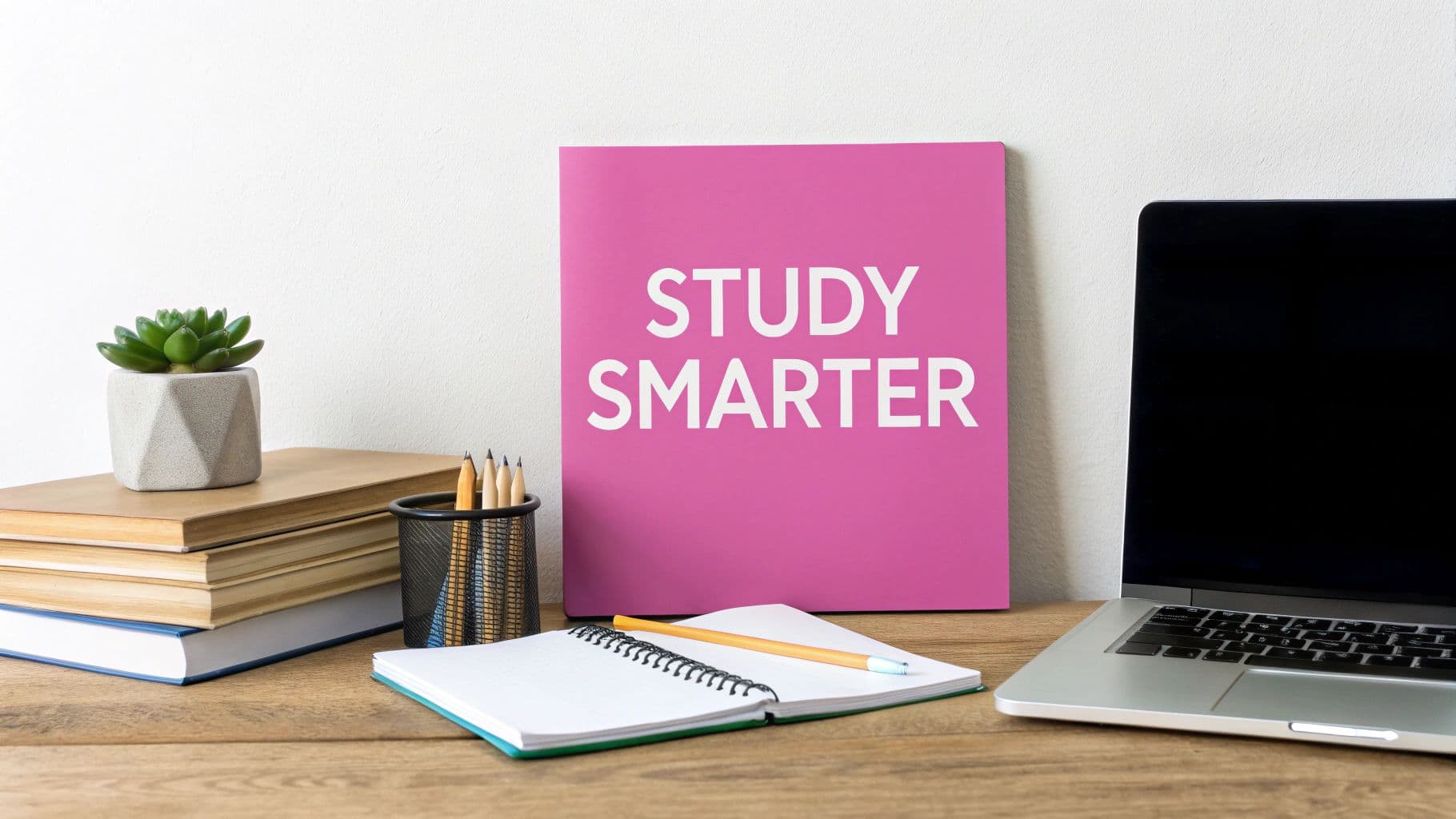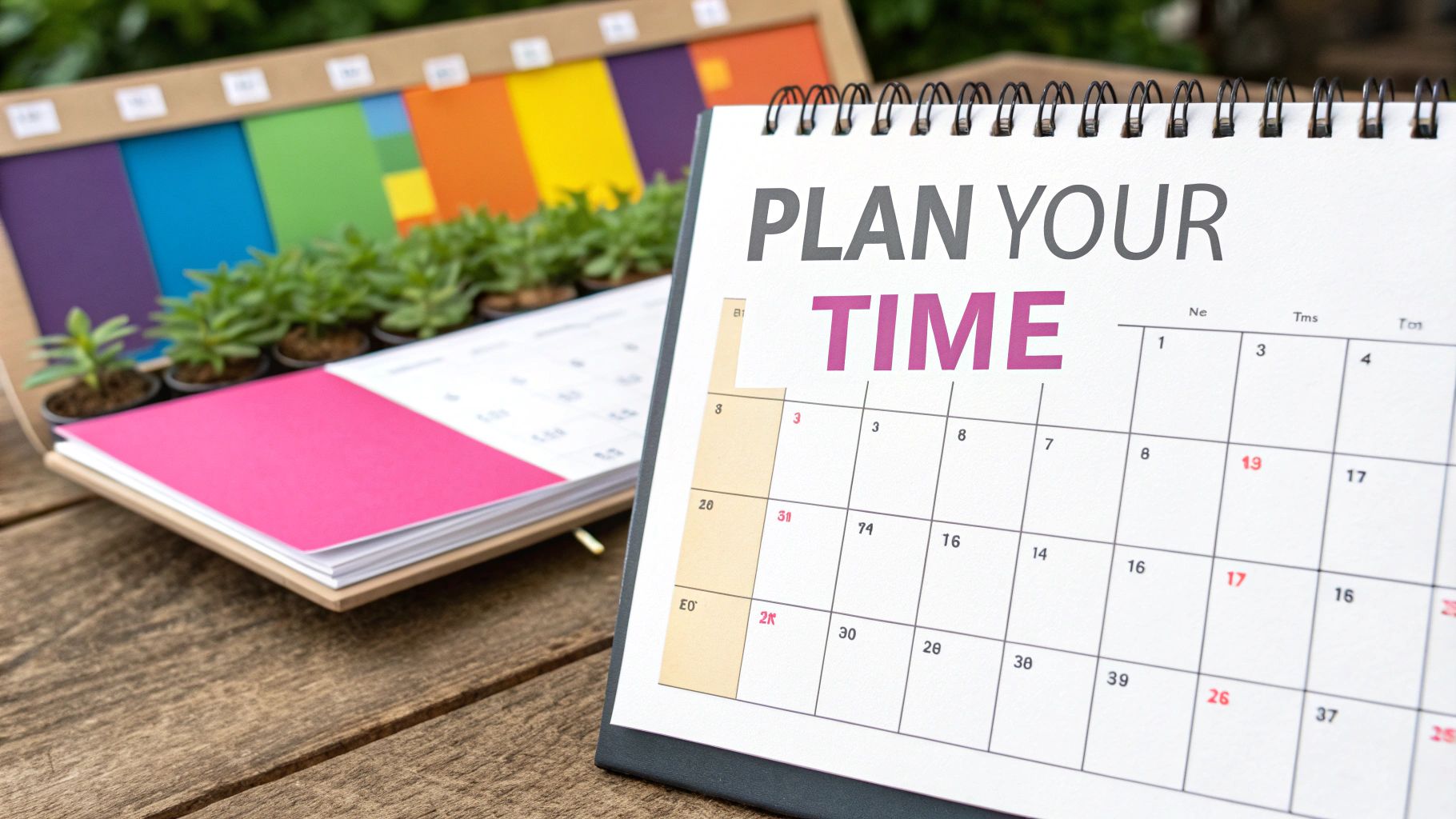
How to Study Smarter Not Harder: Expert Strategies for Breakthrough Results
Breaking Free from Ineffective Study Habits

Many students spend countless hours highlighting textbooks and re-reading notes, yet find themselves struggling to retain information. While these traditional study methods feel productive in the moment, research shows they often provide a false sense of learning without delivering real results. Let's explore how to move beyond these passive approaches and develop study habits that actually work.
Why Highlighting and Re-Reading Fail
Think about the last time you highlighted important passages in a textbook or repeatedly read the same chapter. While these techniques are common, they create an illusion of understanding without helping you truly grasp the material. It's similar to looking at a map over and over without ever walking the actual streets – you might recognize the layout, but you won't really know your way around. These passive methods don't push your brain to actively process and remember information, which is essential for real learning.
The Power of Active Recall
The key to effective studying lies in active recall – deliberately trying to remember information rather than just reviewing it. When you challenge yourself to recall concepts without looking at your notes, you strengthen the neural pathways that help you retain that knowledge long-term. For example, after reading a section, close your book and explain the main points out loud. Though this requires more mental effort than re-reading, it's like exercising a muscle – the work you put in makes it stronger.
Practical Strategies for Active Learning
You can transform your study sessions with these proven active learning methods:
- Self-testing: Create flashcards, complete practice problems, or write your own quiz questions to check your understanding
- Concept Mapping: Draw diagrams showing how different ideas connect to help organize information in your mind
- Explanation: Teach the material to a friend or record yourself explaining concepts to identify gaps in your knowledge
- Interleaving: Switch between related topics instead of focusing on one subject for too long to build stronger mental connections
Research consistently shows these active techniques lead to better test performance compared to passive review methods. For instance, students who regularly test themselves on material score significantly higher than those who simply re-read their notes. By replacing ineffective study habits with active learning strategies, you can turn mundane review sessions into dynamic learning experiences that boost both understanding and retention. The path to studying smarter starts with being more engaged with the material.
Mastering the Science of Distributed Practice
Learning effectively requires not just what you study, but when and how often you review the material. The science of distributed practice offers clear evidence that spacing out study sessions leads to better long-term retention compared to cramming everything at once. By breaking up learning into shorter, focused sessions with breaks in between, you give your brain the chance to process and strengthen memories over time.
Why Cramming Doesn't Work
Consider how physical exercise works – doing one intense workout won't build lasting strength, but consistent training over time creates real results. Similarly, trying to force large amounts of information into your brain during a single marathon study session may feel productive in the moment, but that knowledge quickly fades. This happens because cramming relies on short-term memory, which can only hold limited information temporarily and doesn't effectively transfer it to long-term memory storage.
The Power of Spaced Repetition
Distributed practice takes advantage of how our brains naturally strengthen memories through repeated recall over increasing time intervals. Each time you review material after a break, you actively retrieve it from long-term memory, reinforcing those neural pathways. For instance, when learning new vocabulary, reviewing words several times on day one, then again after a few days, and once more the following week leads to much better retention than trying to memorize them all at once.
Implementing Distributed Practice: A Practical Guide
Here's how to effectively incorporate distributed practice into your study routine:
- Plan Ahead: Map out a schedule that spreads review sessions across days or weeks rather than hours. This requires advance planning to ensure regular review time, even when tests seem distant.
- Vary Your Intervals: Begin with brief gaps between reviews, then steadily increase the spacing. Review new content after a few hours, then a day later, then three days later, and so on.
- Use Active Recall Techniques: Pair distributed practice with active methods like self-quizzing and flashcards. This combination amplifies both the spacing effect and retrieval practice benefits.
- Be Flexible: While consistency matters, unexpected events happen. If you miss a planned review, simply adjust your schedule and resume as soon as possible. Don't let small disruptions derail your overall study strategy.
Optimizing Your Study Time
Distributed practice forms a key foundation for studying more effectively. By following this evidence-based approach, you can improve how well you retain information and perform academically without feeling overwhelmed. This allows you to learn more efficiently in shorter sessions, leaving time for other important activities in your life.
Making Active Recall Work for Better Learning

Now that we understand why passive learning falls short and how spacing out practice sessions helps, let's explore active recall – a powerful method that helps you learn and retain information more effectively. Instead of just reading over notes repeatedly, active recall pushes you to retrieve information from memory, similar to how you'll need to use it later. This mental workout strengthens the connections in your brain that store what you're learning.
Understanding Why Active Recall Makes Learning Stick
Think about learning a new language. Simply reading a vocabulary list might help you recognize words, but could you actually use them in conversation? Probably not. That's because passive reading doesn't create strong memory pathways. Active recall, on the other hand, is like practicing real conversations – it forces you to pull information from your memory, making it easier to access later. It's similar to learning an instrument – you can't master a song by only reading the music. You need to practice playing it repeatedly to build both muscle memory and mental fluency.
Practical Ways to Use Active Recall in Your Studies
Here are several proven methods to make active recall part of your study routine:
-
Self-Testing: Create flashcards, answer practice questions, or make your own quizzes. Testing yourself regularly shows what you know well and what needs more work. For example, after reading about the French Revolution, try listing key events and people without looking at your notes. This process helps move information into your long-term memory.
-
Concept Mapping: Draw diagrams showing how different ideas connect, especially helpful for subjects with many related concepts. As you map these connections, you strengthen your understanding of both the big picture and the details. In biology, for instance, mapping out the stages of photosynthesis helps you see how each step flows into the next.
-
The Feynman Technique: Try explaining what you're learning as if teaching it to someone else in simple terms. If you can't explain it clearly, you've found gaps in your understanding that need attention. The process of breaking down complex ideas helps ensure you truly grasp them.
-
Interleaved Practice: Mix up different topics during study sessions rather than focusing on just one subject for a long time. This might mean alternating between algebra and geometry problems in math. Switching between related concepts challenges your brain to retrieve information in different contexts, making your knowledge more flexible and useful.
Measuring Success and Fine-Tuning Your Methods
Keep track of how well these active recall techniques work for you. A study journal can help – note which methods you use, what you study, and how well you remember the information later. This record helps you identify your most effective study approaches and adjust your habits accordingly. By regularly reviewing and updating your study strategy, you'll build strong learning skills that serve you well throughout your academic journey.
Creating Your Ultimate Learning Environment

The space where you study directly affects how well you learn. A well-designed study environment helps you maintain focus, stay organized, and retain information more effectively. By thoughtfully setting up your study space, you can create conditions that support productive learning sessions rather than fighting against distractions and discomfort.
Taming the Digital Beast: Minimizing Distractions
Most students today face a constant barrage of digital interruptions that can derail their studies. Social media notifications, email alerts, and endless online content compete for attention and make it hard to concentrate. Research shows that trying to multitask actually reduces our ability to learn effectively. To combat this, set clear boundaries around technology use during study time – silence notifications, use website blocking apps when needed, and let others know when you need uninterrupted focus time. These simple steps create the mental space needed for deep learning.
Organization is Key: Streamlining Your Study Materials
A messy study area makes it harder to find what you need and stay on task. Take time to organize your materials in a way that makes sense for your study routine. For instance, try color-coding notes by subject, using labeled folders to group related materials, or creating an organized digital file system. When everything has its place, you spend less time searching and more time learning. This principle applies equally to physical and digital materials – a clean computer desktop helps just as much as a tidy desk.
Comfort and Personalization: Designing Your Ideal Study Zone
Physical comfort has a major impact on your ability to focus and learn. Choose a supportive chair, ensure proper lighting, and maintain a comfortable room temperature. Add personal touches that help you feel motivated and at ease – maybe some plants, inspiring artwork, or calming scents. The goal is to create a space where you can comfortably spend focused time without physical distractions getting in the way of learning.
Adapting Your Space: Different Tasks, Different Environments
Not all study tasks work best in the same environment. Reading complex material might require absolute quiet, while group projects benefit from a more social setting. Pay attention to which environments help you focus best for different types of work. Sometimes simply changing locations can refresh your motivation and creativity. Try studying in different places to discover what works for you – the library, a coffee shop, or outdoor spaces might each serve different purposes in your learning routine.
Building a Strategic Study Timeline
Success in school depends on thoughtfully planning your study schedule ahead of time. Rather than resorting to frantic cramming before deadlines, effective students map out their learning over multiple weeks and months. Like training for a race, improving your knowledge requires sustained, organized practice – not desperate last-minute efforts.
Planning for Success: Creating a Realistic Study Schedule
A solid study timeline starts with understanding your specific needs and class requirements. First, list out all major exams, papers, and projects on your calendar. Next, split big assignments into smaller, concrete tasks. For example, space out a research paper across weeks – first selecting your topic, then gathering sources, outlining, drafting, and polishing. This prevents feeling swamped and helps monitor your progress. Also consider your natural energy patterns. Schedule challenging work during your peak focus hours, like math in the morning if you're clearest then.
Balancing Multiple Subjects: Effective Time Allocation
When taking several classes at once, smart time management becomes essential. Give each subject attention based on its difficulty and grade weight. A complex calculus course may need more study slots than a straightforward history class. However, set aside at least some review time for every subject. Brief but regular practice builds lasting knowledge. Create a visual schedule by mapping subjects on a calendar with different colors. This shows at a glance if you're giving enough attention to each class.
Staying Flexible: Adapting to Unexpected Challenges
Even carefully made study plans face interruptions from illness, family events, or other surprises. Build buffer time into your schedule to handle the unexpected without stress. Leave some open blocks for catch-up work or rescheduling. This prevents minor disruptions from completely derailing your progress. A flexible timeline helps maintain steady learning even when life gets busy.
Maintaining Momentum: Strategies for Consistent Studying
Regular study habits create the best results. Treat study sessions as important appointments and create designated distraction-free spaces for focused work. Break up long study blocks with short breaks to stay fresh and alert. Pay attention to what study lengths work best for you – many students do well with focused 25-45 minute sessions. Taking brief breaks between topics helps prevent mental fatigue and makes study time more productive overall.
Integrating Physical and Mental Wellness

Your study success depends on more than just good study habits and an organized workspace. Just as athletes need proper training and recovery to perform their best, students must take care of their physical and mental health to reach their full learning potential. By understanding how wellness impacts learning, you can create study habits that work with your body and mind rather than against them.
The Sleep-Study Connection: Rest for Success
Quality sleep plays a vital role in learning and memory. When you sleep, your brain processes and stores new information, similar to filing away important documents. Getting insufficient sleep disrupts this natural filing system, making it harder to recall what you've studied. Most students need 7-9 hours of sleep each night to support memory formation and maintain sharp focus during study sessions.
Managing Stress: Keeping Calm Under Pressure
While some stress is normal for students, too much stress makes it difficult to concentrate and retain information. Simple stress management techniques can make a big difference in your ability to learn effectively. Taking short breaks for exercise, practicing mindfulness, or spending time outdoors helps clear your mind. Even a brief 5-minute walk or a few deep breaths between study sessions can help you regain focus and reduce anxiety.
Fueling Your Brain: The Power of Nutrition
Your food choices directly affect your ability to learn and concentrate. Your brain needs steady fuel from nutritious foods to work at its best. Focus on eating plenty of fruits, vegetables, whole grains, and lean proteins to maintain consistent energy levels while studying. Skip sugary snacks and drinks that lead to energy crashes. Instead, choose brain-friendly snacks like nuts, seeds, and dark chocolate to stay focused during long study sessions.
Movement and Learning: Active Body, Active Mind
Physical activity does more than keep you fit – it helps your brain work better too. Exercise increases blood flow to your brain, bringing oxygen and nutrients that improve memory and thinking skills. You don't need intense workouts to get these benefits. A walk around the block or a quick bike ride can refresh your mind as effectively as a coffee break. Regular movement naturally boosts your energy and ability to learn.
Building Healthy Habits for Long-Term Success
Making wellness part of your daily routine creates lasting positive change. Smart studying isn't just about techniques – it's about taking care of yourself so you can learn efficiently. When you prioritize sleep, stress management, nutrition, and exercise, you build a strong foundation for learning success. This balanced approach helps you maintain the energy and mental clarity needed to achieve your academic goals while staying healthy and happy.
Ready to transform your notes and study materials into engaging, easy-to-digest videos? Check out Notescast, the innovative app designed to make learning addictive! Boost your retention, accelerate your learning, and join a community of students who are studying smarter, not harder. Visit Notescast today and discover a new era of learning!
